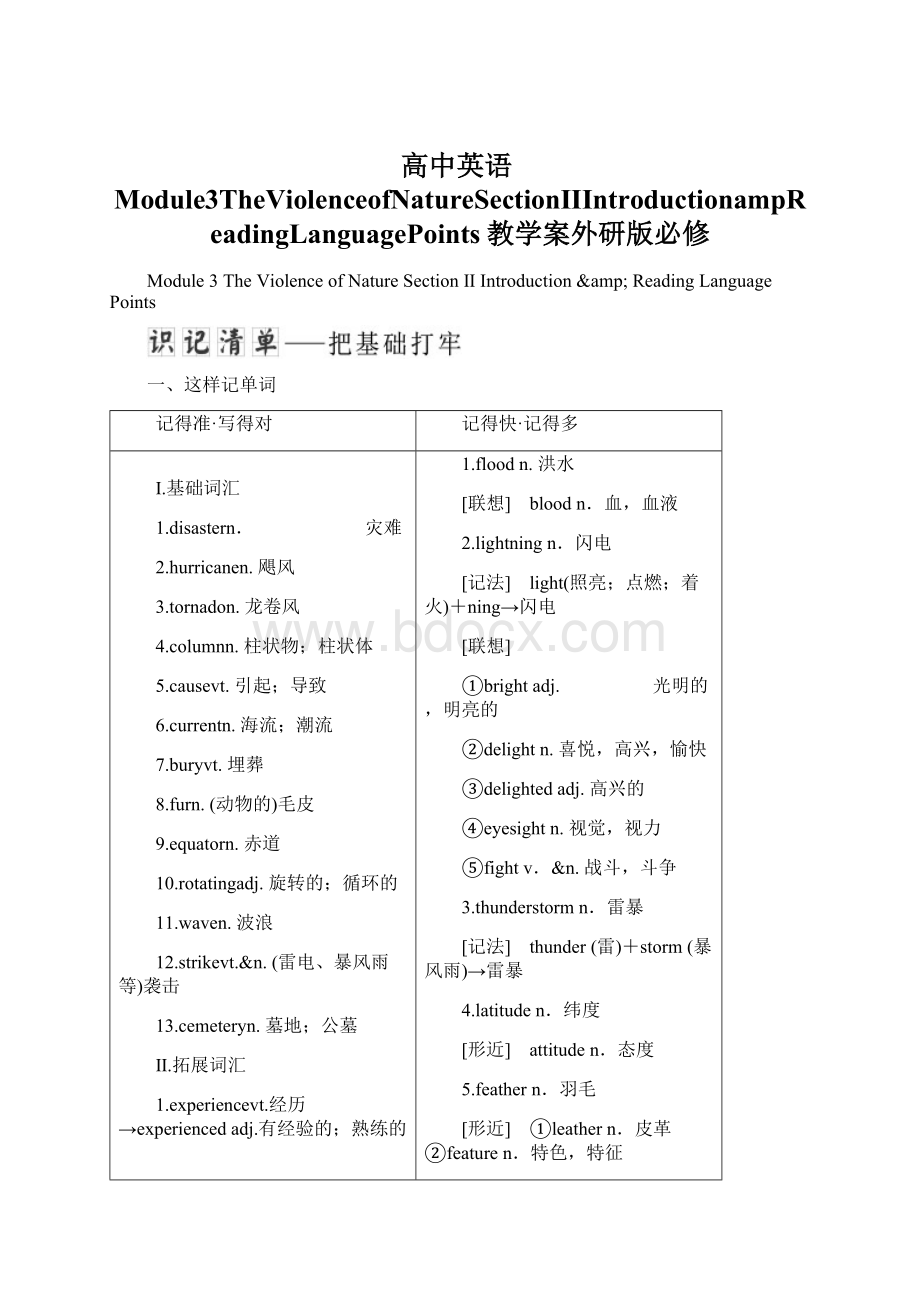高中英语Module3TheViolenceofNatureSectionⅡIntroductionampReadingLanguagePoints教学案外研版必修.docx
《高中英语Module3TheViolenceofNatureSectionⅡIntroductionampReadingLanguagePoints教学案外研版必修.docx》由会员分享,可在线阅读,更多相关《高中英语Module3TheViolenceofNatureSectionⅡIntroductionampReadingLanguagePoints教学案外研版必修.docx(16页珍藏版)》请在冰豆网上搜索。

高中英语Module3TheViolenceofNatureSectionⅡIntroductionampReadingLanguagePoints教学案外研版必修
Module3TheViolenceofNatureSectionⅡIntroduction&ReadingLanguagePoints
一、这样记单词
记得准·写得对
记得快·记得多
Ⅰ.基础词汇
1.disastern. 灾难
2.hurricanen.飓风
3.tornadon.龙卷风
4.columnn.柱状物;柱状体
5.causevt.引起;导致
6.currentn.海流;潮流
7.buryvt.埋葬
8.furn.(动物的)毛皮
9.equatorn.赤道
10.rotatingadj.旋转的;循环的
11.waven.波浪
12.strikevt.&n.(雷电、暴风雨等)袭击
13.cemeteryn.墓地;公墓
Ⅱ.拓展词汇
1.experiencevt.经历→experiencedadj.有经验的;熟练的
2.furnituren.家具→furnishvt.配置(家具等);装备
3.occurvi.发生→occurrencen.发生的事情,存在的事物
4.violentadj.猛烈的;激烈的;强烈的→violentlyadv.猛烈地;强烈地→violencen.暴力;强烈
1.floodn.洪水
[联想] bloodn.血,血液
2.lightningn.闪电
[记法] light(照亮;点燃;着火)+�ning→闪电
[联想]
①brightadj. 光明的,明亮的
②delightn.喜悦,高兴,愉快
③delightedadj.高兴的
④eyesightn.视觉,视力
⑤fightv.&n.战斗,斗争
3.thunderstormn.雷暴
[记法] thunder(雷)+storm(暴风雨)→雷暴
4.latituden.纬度
[形近] attituden.态度
5.feathern.羽毛
[形近] ①leathern.皮革 ②featuren.特色,特征
6.occurvi.发生
[同义]
①happenvi. (偶然)发生
②takeplace(计划等)发生
③breakout(灾害等)爆发
二、这样记短语
记牢固定短语
多积常用词块
1.because_of 因为,由于
2.pick_up 卷起;掀起;用车接送
3.take_off 脱下;起飞
4.put_down放下;写下
5.of_all_time有史以来
6.end_up结束
7.on_average平均
8.refer_to参考,指的是
1.onthesamelatitude 在同一纬度
2.arotatingcolumnofair一个旋转气柱
3.morethan400kilometresperhour每小时400千米以上
4.inthenexttown在临近的城镇
5.hitthecity袭击了这座城市
6.theeastcoastoftheUS美国的东部海岸
7.bythelate1890s到19世纪90年代末
8.anineteenth�centuryIrishactor一位19世纪的爱尔兰演员
三、这样记句式
先背熟
再悟通
后仿用
1.Theycandestroyhouses,butleavethefurnitureinsideexactlywhereitwas.
它们能毁掉房子,却把房内的家具原封不动地留在原处。
“leave+宾语+宾语补足语”结构,表示“让……处于某种状态”。
Theywentofftogetherandleft_me_sitting_therealone.
他们一起离开了,让我独自一人坐在那里。
2.Theworsttornadoofalltimeoccurredin1925,affectingthreeUSstates:
Missouri,IllinoisandIndiana.
有史以来最严重的一场龙卷风发生在1925年,影响了美国的三个州:
密苏里州、伊利诺伊州和印第安纳州。
现在分词affectingthreeUSstates作状语,表结果。
Thefirelastednearlyamonth,leaving_nothing_valuable.
大火持续了近一个月,几乎没剩下什么有价值的东西。
3.Bythetimeitended,morethan700peoplehadbeenkilledand2,700hadbeeninjured.
等到风停时,已有700多人死亡,2700人受伤。
bythetime“到……为止”,此处相当于连词,引导时间状语从句。
Bythetimethefireenginearrived,thefirehad_been_put_outbytheinhabitants.
当救火车到达的时候,火已经被居民们扑灭了。
1.(教材P21)Haveyoueverexperiencedaflood?
你曾经经历过一次洪水吗?
experiencevt.经历;体验n.经验;经历
(1)havemuch/littleexperiencein
在……方面有丰富的/没有经验
from/byexperience 凭经验,从经验中(得出)
(2)experiencedadj.有经验的,熟练的
beexperiencedat/in在……方面有经验
①Pleasetellmeyourexperienceintheflood.
请告诉我你在那次洪水中的经历。
②Heisveryexperiencedat/inmendingcars.
他修车很有经验。
③Shehasbecomequiteexperienced(experience)at/inteachingprimaryschoolstudents.
她教小学生已经很有经验了。
[名师点津] experience作“经验”讲时,为不可数名词,其前可以用little,much等来修饰;作“经历”讲时,为可数名词。
④Hehadmanyinterestingexperiences(experience)whiletravellinginAfrica.
他在非洲旅行时,有许多有趣的经历。
[语境串记] Mr.Smithisanofficerwithexperience,whohasmanyoddexperiences.Evenhehasexperiencedwhatdeathmeans.
史密斯先生是位有经验的军官,他有着很多奇怪的经历。
他甚至体验过什么是死亡。
2.(教材P21)Forexample,whatcausesthem?
例如,它们是如何发生的?
causevt.引起;造成n.原因;事业
(1)cause...todosth. 引起……做某事
causesb.sth.引起某人某事;给某人招致某事
(2)causeandeffect因果
①Sorrytohavecausedyousomuchtrouble.
对不起,给你带来如此多的麻烦。
②Thebadweatheriscausing(cause)problemsformanyfarmers.
恶劣的天气给许多农民造成了困难。
③Hisillnesscausedhimto_miss(miss)thegame.
他因病错过了那场比赛。
④Canyoutellmethecauseandeffectofit?
你能不能告诉我它的前因后果?
[辨析比较] cause,reason,excuse
cause
表示“直接原因”,后面常接介词of
reason
表示“解释某个行为的理由”,后面通常接介词for或why引导的定语从句
excuse
表示“借口”,后面常接介词for
[语境串记] Lazinessisthecauseofourfailureandweshouldn’ttrytofindanyexcuseandnowwehaveeveryreasontoworkharder.
懒惰是失败的原因,我们不应该找任何借口,现在我们有充分的理由更加努力工作。
3.(教材P23)AlmostallofthemoccurintheUS,intheareafromTexasinthesoutheasttoSouthDakotainthenorth.
几乎所有的龙卷风都发生在美国,从东南部的德克萨斯州到北部的南达科他州。
occurvi.发生;被想起
sth.occur(s)tosb.某人想到某事;某事浮现在某人的脑海中
Itoccurstosb.
某人想到……
①Ihopethiswon’toccuragain.
我希望不要再发生这种事情。
②Justthenabrightideaoccurred_to_me.
那时,我想到一个好主意。
③Itneveroccurredtoherto_ask(ask)anyone.
她从未想到去问问别人。
[辨析比较] occur,happen,takeplace,breakout
occur
vi.可指某事偶然发生或者按计划进行,可与happen互换,但比较正式。
表示“某人想到”时,用occur,后接介词to
happen
vi.特指某事偶然发生。
表示“某人发生了某事”,要用sth.happen(s)tosb.;happentodosth.表示“碰巧做某事”
takeplace
多指有计划、有目的、有步骤地发生,比如举办活动、发生变化等
breakout
多指自然灾害、战争、疾病的爆发
以上这些表示“发生”的单词或短语都不能用于被动语态
选择上述词语填空
④Anearthquakebroke_outlastmonth.
⑤Greatchangeshavetaken_placeheresincelastyear.
⑥Theaccidenthappened/occurredatabout10o’clock.
⑦Shehopednothingbadwouldhappentoherhusband.
⑧Agoodideaoccurredtome.
4.(教材P23)Tornadoescanpickupcars,trainsandevenhousesandputthemdowninthenextstreet—oreveninthenexttown.
龙卷风能卷起汽车、火车甚至房子,把它们卷到邻近的街道——甚至邻近的城镇。
pickup卷起,拾起,捡起;(用车)接某人;接收,收听(节目,电台);(偶然)学会(语言、技能等);好转;顺便买;整理
写出下列句中pickup的含义
①Theboypickedupthehatfortheoldman.拾起
②Youshouldpickupthetoolsafterwork.整理
③Heispickinguptheskillsquickly.(偶然)学会(语言、技能等)
④IpickedupFujianontheradiolastnight.接收,收听(节目,电台)
⑤Abitofexercisewillpickthepatientup.好转
⑥I’llpickyouupatyourhometomorrow.(用车)接某人
⑦Don’tforgettopickuptheicecreamonyourwayhome.顺便买
5.(教材P23)Bythelate1890s,hehadmovedtoGalveston,wherehediedin1899,ayearbeforethehurricanestruck.
到19世纪90年代末,他已经移居加尔维斯顿,于1899年在那里去世,也就是飓风袭击那里的前一年。
strikev.(struck,struck/stricken)(雷电、暴风雨等)袭击;打,击中;打动,吸引;想起;(时钟)敲响;擦燃n.&vi.罢工
(1)sth.strike(s)sb. 某人想到某事
Itstrikessb.todo.../Itstrikessb.that...
某人想到……
strikesb.in/onthe+身体部位 击打某人某部位
(2)be/goonstrike 在/举行罢工
①Theboatstruckonarock.
小船触礁了。
②Astonestruckmeonthehead.
一块石头打中了我的头。
③Agoodideastruck_the_manager.
经理想到了一个好主意。
④Thevisitorswere_struck(strike)bythebeautyofthecountry.
游客们被这乡村的美丽打动了。
[辨析比较] strike,hit,beat
strike
指用力“击打”,强调一次性的“打击、敲击”等,可与hit通用;也可用作比喻意义
hit
侧重“击中”;用作名词时,还可表示“成功而轰动一时的演出或人物”
beat
常指连续用力击打,可用于在游戏、比赛中击败对方,还可指心脏或脉搏的跳动
形象记忆
选择上述单词填空
⑤TomwassoangrywithBobthathehitBobonthehead.
⑥Whatastrangeman!
Heloveshiswife,butattimeshebeatsher.
⑦Whatyousaidatthemeetingyesterdaystruckmeverymuch.Iwasmoved.
6.(教材P23)ThecemeterywhereCoghlanwasburiedwasdestroyedbythehurricaneandCoghlan’scoffinendedupinthesea.
科格伦所埋葬的公墓被飓风摧毁,他的棺材最终被卷入了大海。
buryvt.埋葬;埋藏
埋头于,专心于
buryone’sfaceinone’shands用手捂住脸
①Wheredoesheburythetreasurechest?
他把珠宝箱藏在哪里了?
②Buried(bury)in/Burying(bury)myselfintheinterestingentertainmentprogramme,Ididn’thearthedoorbellringing.
专心于有趣的娱乐节目,我没听到门铃响。
③Sheburiedherfaceinherhandsandbegantocry.
她用手捂住脸哭了。
endup结果为……,以……结束
endupwith... 以……而结束
endupin...结果到了……的地步
endupas...最终成为
endupdoingsth.结果做了……
①Ifhecarriesondrivinglikethat,he’llendupdead.
他照那样开车,早晚得死于非命。
②Ifyoudothat,you’llendupwitheggonyourface.
你要是做那件事,必将以耻辱告终。
③Ifyoucontinuetosteal,you’llendupinprison.
你要是继续行窃,终归得进监狱。
[名师点津] endupin后接表示结果的名词,endupwith后接表示方式的名词,endupas后接表示身份、职务的名词。
1.Theycandestroyhouses,butleavethefurnitureinsideexactlywhereitwas.
它们能毁掉房子,却把房内的家具原封不动地留在原处。
本句中leavethefurnitureinsideexactlywhereitwas是“leave+宾语+宾语补足语”结构,表示“让……处于某种状态”。
补语是where引导的地点状语从句。
①Shemusthaveleftherhandbagwheresheoftenhasadatewithherboyfriend.
她肯定是把手提包忘在了她经常和男友约会的地方了。
该结构中的宾语补足语还有以下几种形式:
(1)名词
②Hisparentsdied,leavinghimanorphan.
父母去世了,他成了孤儿。
(2)形容词
③Youmustleavethedooropen.
你必须让门开着。
(3)副词
④Don’tleavethelightonwhenyougoout.
出去时,别让灯开着。
(4)介词短语
⑤Don’tleavethechildathomealone.
别把孩子独自一人留在家中。
(5)现在分词(表示主动、进行的动作)
⑥Don’tleaveherwaiting(wait)outsideintherain.
别让她在外边雨中等着。
(6)过去分词(表示被动、完成的动作)
⑦Didyouleavethedoorsandwindowsfirmlyfastened(fasten)?
你把门窗关紧了吗?
(7)不定式(表示动作过程)
⑧Welefthimto_paint(paint)thegate.
我们让他漆门。
2.Bythetimeitended,morethan700peoplehadbeenkilledand2,700hadbeeninjured.
等到风停时,已有700多人死亡,2700人受伤。
bythetime“到……为止”,此处相当于连词,引导时间状语从句,当by后接过去的时间时,句子用过去完成时。
①Bythetimeshewas15yearsold,shehadwrittenthreelongnovels.
到她15岁时,她已经创作了三部长篇小说。
②Bytheendoflastmonth,wehad_learnt(learn)morethan300words.
到上个月底,我们已经学了300多个单词了。
[名师点津] bythetime引导的时间状语从句,若表示到将来某个时候为止,主句常用将来完成时。
③BythetimeJohnfinisheshishomework,hisclassmateswill_have_left(leave)toplayfootball.
到约翰做完作业时,他的同学将已离开去踢足球了。
Ⅰ.单句语法填空
1.Youseemedtobedeeplystruck(strike)byhisskill.
2.Hisletterleftmefeeling(feel)sadallthetime.
3.Doesshehavemuchexperience(experience)ofteaching?
4.Itrainedheavilyinthesouth,causing(cause)seriousfloodinginseveralprovinces.
5.Itneveroccurred(occur)tohimthatthetropicalviolentthunderstormswouldcausesoterrifyingwaves.
6.ShesoonpickedupFrenchwhenshewenttoliveinFrance.
7.You’llhavetoburyyourselfinyourstudiesifyouwanttopasstheentranceexaminations.
8.Bythetimeyougetthere,themeetingwill_be_over(over).
Ⅱ.选词填空
occur,pickup,strike,endup,becauseof,takeoff,putdown,ofalltime
1.Survivorsoftheshipwreckwerepicked_upbysmallboats.
2.Theclockstruckandwerealizeditwastwoo’clock.
3.Helen’staking_offhercoatbecauseitistoohotintheroom.
4.I’lljustput_downyourphonenumberinmybook.
5.Thelittleboygotpunishedbecause_ofwhathehaddone.
6.Asweknow,Beethovenisthegreatestmusicianof_all_time.
7.Weshouldallrememberthatsomegreatscientificdiscoveriesoccurredbychance.
8.Hejoinedthefirmasanofficeboy,buthegainedrapidpromotion,andended_